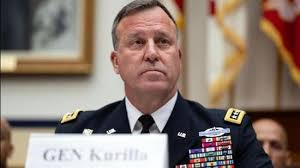US reaffirms support to India on terror, but its Military General says ties with Pakistan also vital to counter IS-KP

The United States has reiterated its unwavering support to India in the global fight against terrorism. However, a senior American military official has emphasized that maintaining a working relationship with Pakistan remains crucial for Washington—particularly to counter the growing influence of ISIS-Khorasan (IS-KP), the regional affiliate of the Islamic State operating in South and Central Asia.
In a recent Congressional hearing, General Michael E. Kurilla, head of the US Central Command (CENTCOM), acknowledged India as a “critical partner” in counterterrorism operations. He noted that the US-India strategic partnership has grown significantly, especially in areas of intelligence-sharing and regional security cooperation.
“India remains a vital ally in ensuring peace and security in the Indo-Pacific region. Our collaboration on counterterrorism is robust, and we fully support India’s efforts to defend itself from cross-border threats,” said Gen. Kurilla.
ISIS-K on the Rise: A Threat Beyond Borders
At the same time, Gen. Kurilla sounded alarm bells over the resurgence of ISIS-Khorasan in Afghanistan and parts of Pakistan. He pointed out that the group is not only rebuilding its operational base but is also actively recruiting from vulnerable regions, including former Taliban and al-Qaeda fighters who feel alienated by recent developments in Afghanistan.
“ISIS-K poses a transnational threat. Its ambitions go beyond Afghanistan, and that includes targeting US interests and allies in the region—including India,” he warned.
The CENTCOM chief stressed that in order to disrupt IS-KP’s plans and prevent potential attacks on American assets or allies, Washington needs ongoing counterterrorism cooperation with Pakistan’s military and intelligence services.
Balancing Act: US Policy Between India and Pakistan
This dual-track approach highlights Washington’s longstanding diplomatic balancing act between South Asia’s nuclear-armed neighbors. The US has steadily deepened its strategic and defense ties with India, especially under initiatives like the Quad (Quadrilateral Security Dialogue), yet it continues to maintain a complex but necessary relationship with Pakistan.
While India views Pakistan as a state sponsor of cross-border terrorism—particularly in Kashmir—the US sees Islamabad as an important player in stabilizing Afghanistan and monitoring extremist networks in the region.
“Working with Pakistan doesn’t diminish our support for India. It’s about addressing shared threats from terror groups that operate across borders,” explained a Pentagon official who spoke on condition of anonymity.
India’s Concerns: Terror Networks Across the Border
India, however, remains deeply skeptical of Pakistan’s counterterrorism commitments. New Delhi has consistently raised concerns about safe havens provided to terror outfits such as Lashkar-e-Taiba (LeT) and Jaish-e-Mohammed (JeM), which have carried out attacks on Indian soil, including the 2008 Mumbai attacks and the 2019 Pulwama bombing.
Speaking at a separate security forum, Indian officials said the US must not equate its security cooperation with Pakistan to the strategic depth it enjoys with India.
“Counterterrorism cooperation must not come at the cost of legitimizing those who have failed to act against groups operating with impunity from their territory,” said a senior Indian security analyst.
Diplomatic Nuance: State Department’s Assurance
Responding to the concerns raised over General Kurilla’s remarks, the US State Department clarified that Washington’s commitment to India’s security remains ironclad.
“We see India as a key partner in promoting regional security and prosperity. At the same time, we engage with Pakistan on issues that serve our national interest, including counterterrorism. These relationships are not mutually exclusive,” a State Department spokesperson stated.
The spokesperson also highlighted that the US has previously urged Pakistan to take concrete steps against terror networks and comply with international counterterrorism obligations.
Regional Experts: Stability Hinges on Collaboration
South Asia experts believe that for any long-term solution to terror threats, particularly the threat posed by ISIS-K, regional players will need to work together—even if indirectly.
“IS-K is not just a threat to the West; it’s a destabilizing force for all of South and Central Asia. The US will need both India’s strategic partnership and Pakistan’s logistical intelligence to contain it,” said Dr. Aparna Pandey, a South Asia policy expert based in Washington.
Outlook: High-Stakes Cooperation
As global terror networks adapt and regroup, the US finds itself in a tightrope walk—strengthening its strategic bond with India while preserving vital security channels with Pakistan.
While New Delhi remains cautious of any US-Pakistan collaboration, American officials insist that this two-pronged engagement is aimed at dismantling terror networks like ISIS-K, not enabling traditional rivalries.
Whether this careful calibration will succeed in neutralizing threats without straining the growing US-India relationship remains to be seen. But for now, Washington appears determined to pursue both tracks—supporting India’s fight against terrorism while keeping lines of communication open with Pakistan.






